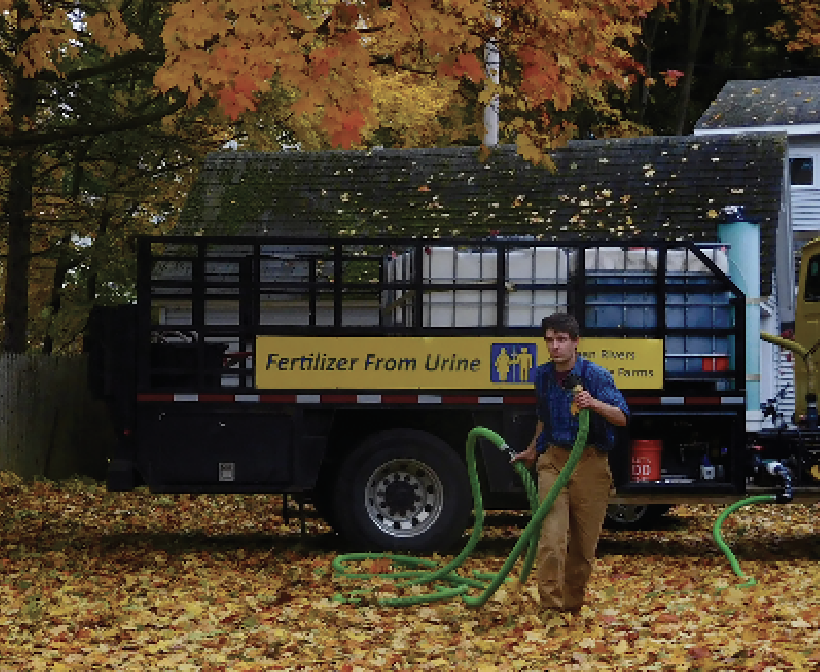By Kate Kampner, Community News Service
Editor’s note: The Community News Service is a program in which University of Vermont students work with professional editors to provide content for local news outlets at no cost.
When Peter Stickney walks along his cow paddocks in the morning, he notes the scattered patches of greener grass across the pasture. He knows what this means: It’s where his cows have peed.
So when the Rich Earth Institute, a Brattleboro organization focused on turning human urine into fertilizer, approached him to be a farm partner, Stickney said it was a no-brainer.
Stickney manages the Elm Lea Farm at The Putney School, a boarding high school in the Windham County town of Putney. For the past few years, alongside six other farms in Vermont and the Northeast, Stickney has been receiving treated urine from Rich Earth Institute to spray across the farmland at Elm Lea.

Courtesy Rich Earth Institute
Rich Earth Institute sends a pump truck out to donors’ homes to collect urine to treat and turn into fertilizer.
The institute, its partners and others in the sustainability industry see the practice — dubbed “peecycling” in national headlines — as a cheap, easy and less-destructive method for fertilizing plants than synthetic fertilizer and as a way for people to rethink their views on whether human waste should really go to waste.
“We’re doing something that is somewhat disruptive and asking for people to look at things differently, change behaviors a little bit, sometimes around where they pee and why,” said Jed Blume, the institute’s development director.
For Stickney, it looks like this: Rich Earth workers haul a tank of treated urine to the farm on a big truck before filling a smaller tank that Stickney can tow across the farm with a tractor.
“I could very quickly see how much darker green the grass was,” he said. “Dark green grass is happy grass — it means it has lots of nutrients. It’s very simple from my end, and it’s very soon that the results are visible, tangible.”
Federal funders are on board. The U.S. Dept. of Agriculture’s Sustainable Agriculture
Research and Education program has given the group close to $325,000 since 2013 to explore urine’s role in fertilizer practices. “This is innovative research, and it could lead to something that could really help farmers in a sustainable way,” said Candice Huber, who oversees the program’s grants for projects in the Northeast pairing researchers and farmers.
The Rich Earth Institute is going on its 12th year now, and the process of collecting urine and getting it to farms has evolved over time, Blume said.
The institute says it collects urine from 230 donors, who use one of two methods provided by Rich Earth. Some donors pee into a funnel screwed to a jug, cap the container and bring it to a drop-off spot. Others own a specialized toilet with a trap installed in the bowl that connects to a separate plumbing line. Urine in the trap gets diverted to a tank that institute workers pump out once or twice a year.
Next, the raw urine is transported from the collection site to a treatment center either on or off a farm. Through storage or pasteurization, at certain temperatures, the urine is treated to use as fertilizer. “The Rich Earth Institute has developed a computer-controlled pasteurizer with a high-efficiency heat exchanger to sanitize urine quickly and energy-efficiently,” the site reads.
Finally, the urine is put on a tractor and put on crop fields.
“There’s been an interest both economically and environmentally in finding more sustainable, equitable, environmentally friendly ways of producing fertilizer, and since our bodies are all little fertilizer factories, folks are starting to connect the dots,” Blume said. “There’s multiple incentives for practicing nutrient recycling both economically and environmentally … The plants like it.”
Synthetic fertilizer is typically made of nitrogen, phosphorus and potassium and often produced through two processes, the Haber Bosch method and traditional mining. Treated urine, which contains all three of those nutrients, is a low-cost and sustainable fertilizer source, according to Rich Earth.
One of the biggest concerns people have about urine fertilizer is pharmaceuticals, said Blume, but after doing a six-year research study with the University of Michigan and the University at Buffalo, the institute found “the pharmaceuticals don’t really accumulate in crop tissue at significant levels … Having that research energized us,” said Blume.
Blume said the practice is becoming more socially acceptable, too. “The global fertilizer industry has seen a lot of volatility with regards to pricing and sourcing,” he said. “Once you explain what the nutrients are, they seem to be really interested in a sustainable form (and) being able to access those nutrients affordably.”
Along with its farm partner program, the institute wants to offer people help through programs like “Urine My Garden,” which teaches gardeners to safely turn their pee into nutrients for their plants at home. And the institute is putting together a manual for farmers to do the same at scale. “We’ve developed a culture of practice around urine recycling,” said education director Julia Cavicchi.
Part of their pitch, to organizations such as the Lake Champlain Basin Program, involves almost philosophical benefits.
“We can actually start to think about, how can we as humans come to heal the Earth with what our bodies produce in a way that is generous to the land,” Cavicchi said. “It’s a hopeful space to be working with in terms of using our bodies to heal.”
Kimmerly Nace had a similar mindset when she and Abraham Noe-Hays created Rich Earth in 2012. Nace remembers how her neighbors would show up to her home in those early days, containers of urine in hand.
“It’s a very hopeful project,” said Nace, who no longer works at the institute. “People begin to feel that something that comes out of their body that’s normally been used as a waste can actually have value in agriculture.”
“Farmers have been really receptive partially because farmers don’t have any ick factor around urine — it’s not different than any other animal manure for farmers,” said Nace.
Nace is now the executive director of Brightwater Tools, a spinoff company that makes the technology Rich Earth uses to separate the urine from wastewater. Currently, she is working at a national level to shift the wastewater industry more toward nutrient recovery.
“We really did intend from the very beginning to be disruptive. To really shake it up and say wait, what are we doing here?” Nace said, comparing urine reuse to windmills and electric cars.
Most of the grants Rich Earth has received from the USDA program are called partnership grants. The awards are capped at $30,000 and go to projects where researchers team up with a farmer to test hypotheses. Researchers set up their projects “so that they understand the needs of the farmer and how their work can really work on a farm.”
Rich Earth has had seven partnership grants since 2013, several at close to the max funding amount.
“They had a lot of projects from us, and they’ve all been involving human fertilizer and testing it on crops and assessing the feasibility and bio-acidification,” Huber said. “Every year there’s discussion about the safety factors, the ability of using urine, as far as people who would be interested in eating products that are grown with that.”
Huber said the federal program has full confidence in the institute’s work: “They are very good with their research in the way that they put it all together, and it’s really very thorough. All the regulations are being followed through the state. Safety-wise we trust that process.”
Thor Retzlaff is the co-founder and chief marketing officer of Wasted, a Burlington company that rents and sells water-saving porta-potties and toilets with eco-friendly features like bamboo toilet paper.
Retzlaff believes in the mission behind the Rich Earth, which his firm works with.
More than a third of the company’s toilets divert urine from other waste. The company collects the urine, processes it and sends it to a local farm as fertilizer. “We’ve been working with the Rich Earth Institute and Brightwater tools since the conception of our company,” Retzlaff said. “They very much inspired us to go and start this thing.”
Retzlaff, Brophy Tyree, and Taylor Zehren began the company after attending a virtual summit hosted by Rich Earth Urine in August 2020. Over the course of three days, Retzlaff said, “they essentially brought together the world’s minds to talk about how valuable piss is.”
He and the other co-founders wanted to take what they learned about urine diversion and combine it with a catchy business model. “From there what we did was identify Vermont as the state that allowed us to turn pee into fertilizer, so it was an obvious choice to move our business to Vermont,” he said.
Wasted toilets are easy to identify by their bright orange color.
Retzlaff said urine-based fertilizer will catch on as evidence of its benefits grows. “There’s been a lot of data aggregating in the past 15 years that essentially says, ‘Hey, this is not only more sustainable than synthetic fertilizer but it’s more productive, it’s producing greater results. It’s a localized way of retaining the nutrients in any given ecosystem.’”
Or as Stickney, the farmer in Putney, put it: “It’s just the simplest thing in the world to do.”




